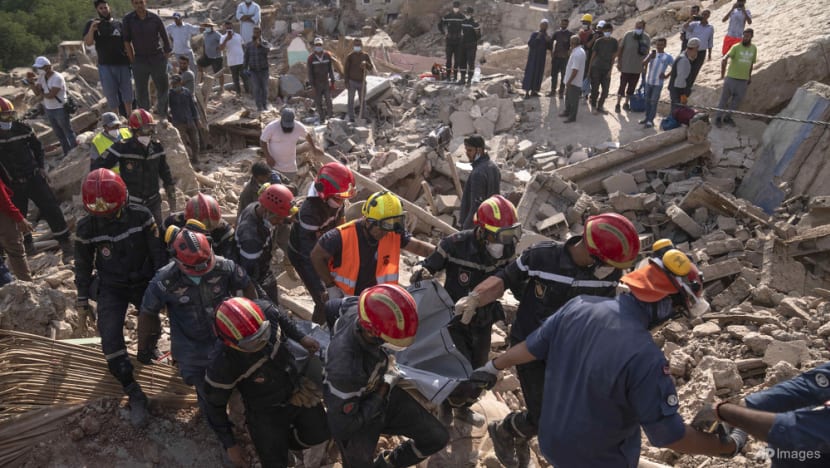Healthcare, clean water, shelter among urgent priorities as Morocco grapples with quake aftermath: Experts
Singapore Red Cross has offered relief assistance but helping on the ground may take a while because the situation is very complicated and complex.

A rescue team recovers the body of a woman who was killed by the earthquake, in the town of Imi N'tala, outside Marrakech, Morocco, Tuesday, Sept. 12, 2023. (AP Photo/Mosa'ab Elshamy)
Healthcare, clean water and shelter are among the urgent priorities in Morocco, where the death toll is expected to climb following its deadliest earthquake in decades, observers said.
The country on Friday (Sep 8) was hit by a 6.8-magnitude quake with an epicentre within the Atlas Mountains south of Marrakech.
The healthcare system in the country was already under a lot of strain before the added pressure of the earthquake, Mr Benjamin William, Singapore Red Cross CEO and secretary general, told CNA’s Asia First on Tuesday.
Statistics show that there are only about seven doctors for every 10,000 Moroccans, he noted.
“There's been some severe damage to a lot of the healthcare clinics and hospitals in the region. And on top of that, the road system and the access systems have been damaged,” he said.
The death toll is likely to rise, he added, both due to the damaged healthcare system and difficulty in accessing mountainous areas.
The lack of clean water may also compound the problems, he said.
“Sanitation is important because otherwise, you have the waterborne diseases, creating a crisis on top of a crisis,” he said.
His organisation is working closely with its counterpart in Morocco and the International Federation of Red Cross and Red Crescent societies, he said.
He noted that the Moroccan Red Cross, one of the primary responders to the earthquake, has about 8,000 volunteers, many of whom are in the High Atlas mountain areas where it is hard to reach.
While Singapore Red Cross has offered assistance for relief items, helping on the ground may take a while, he said.
“We are looking at the next stage, including possibly deploying our own team on the ground. But that will take a while because the situation on the ground is very complicated and complex. And the terrain is not one that most of us are used to,” he said.
PROBLEMS IN MOUNTAINOUS REGIONS
Morocco is not a surprising place in terms of earthquakes.
While the latest one was the largest in recent times, there have been others with high death tolls as well, said Professor of Tectonics at University of Oxford, Richard Walker.
“It's all related to the slow northward motion of the African continent relative to Europe and that slow shortening is gradually crumbling up mountain ranges and this continues to the present day,” said Prof Walker, whose research includes identifying and studying active faults.
Homes in the mountainous villages are typically built with unreinforced masonry using stone or mud brick, noted Prof Walker.
“These are good materials in a resource-limited area … but sadly they are not very strong when it comes to earthquake shaking,” he told CNA938’s Singapore Today on Tuesday.
“Often, when those types of materials are subjected to strong shaking, they do collapse and so within those more rural areas we are seeing … really quite large amounts of damage.”
The aftershocks can still be dangerous, he added.
Both observers stressed the need for proper shelter for the homeless, especially as colder months approach.
“We will probably need much more shelter and household items to support the survivors. Also to take into account the fact that the winter months are coming and the temperatures can fall to below 10 degrees (Celsius). So you also need to take into account the fact that they will need proper shelter,” said Mr William.
He added that rebuilding the villages that have been completely destroyed will take a long time.
“This is a crisis that will not go away tomorrow. It is going to be a long term, at least months before the situation stabilises,” he said.
PREPARING FOR EARTHQUAKES
While scientists cannot predict earthquakes, an area’s risk for an earthquake can be calculated, said Prof Walker.
“We can look for evidence in historical records to show that there are earthquakes. We can look for evidence in the landscape in the geology that this is an area that is susceptible to earthquakes,” he said.
“So, really, the answer is actually in preparation.”
Understanding the Morocco earthquake - Listen to Daily Cuts:
Related:
Such preparation involves educating those living in those areas on what they should be doing to minimise their risk and ensure that buildings are less vulnerable to earthquake shaking.
This requires a long-term approach, he added.
“It's not something specific to Morocco. This is a problem across many parts of the world that are susceptible to earthquakes,” he said.
“This is a widespread problem. Unfortunately, it requires a very difficult and very long term approach to try and increase resilience.”














